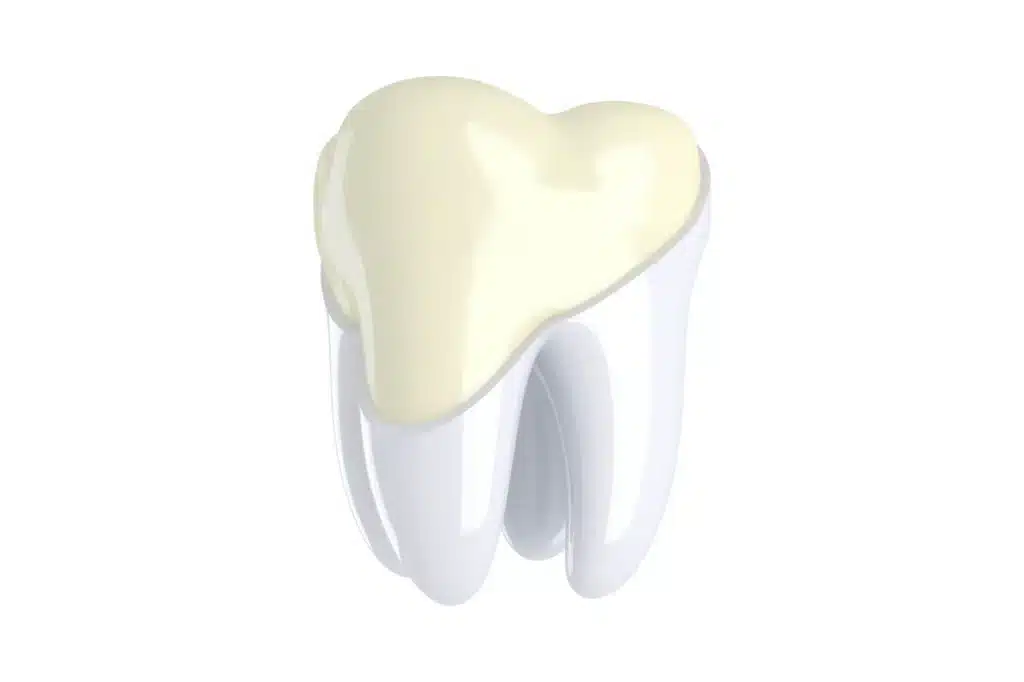Are you afraid of enjoying food because of your tooth sensitivity? Sensitive teeth can cause challenges in your daily life. To avoid teeth sensitivity, you must understand its cause and get proper treatment. Read more to know how you can get rid of it.
Tooth Sensitivity
Tooth sensitivity, or dentin hypersensitivity, is a common dental condition characterized by sharp, sudden pain or discomfort in response to various triggers, such as hot, cold, sweet, or acidic stimuli.
It occurs when the underlying dentin, a porous tissue beneath the enamel, becomes exposed, allowing external factors to stimulate nerve endings within the tooth, leading to discomfort or pain.
Symptoms
Sharp, Sudden Pain
- Tooth sensitivity often manifests as sharp, sudden pain.
- Triggers include hot, cold, sweet, or acidic foods and beverages.
Discomfort When Brushing
- Brushing can provoke discomfort.
- This sensation may feel like a sudden jolt of pain and could lead to bleeding or gum sensitivity.
Pain with Air or Cold Drinks
- Exposure to cold air or cold drinks can induce painful reactions.
- The discomfort experienced can be intense, making it challenging to enjoy cold beverages or breathe in cold weather.
Causes
Gum Recession
Receding gums can expose the vulnerable tooth roots, a leading cause of tooth sensitivity. The roots lack the protective enamel, making them susceptible to pain when triggered by hot, cold, or sweet sensations. Risk factors include aggressive brushing, gum disease, or simply aging.
Enamel Erosion
The enamel, the outermost layer of teeth, acts as a shield. When it erodes due to acidic foods, drinks, or aggressive brushing, it exposes the dentin underneath. Dentin contains microscopic tubules that connect to the tooth’s nerve, causing sensitivity.

Tooth Decay
Cavities, or tooth decay, can lead to sensitivity. Decay creates openings in the tooth’s structure, allowing stimuli to reach the nerve. Preventive measures include maintaining good oral hygiene, regular dental check-ups, and a balanced diet to strengthen enamel.
Medical Conditions
Acid Reflux
Acid reflux can negatively impact oral health. Stomach acid can reach the mouth, eroding enamel and causing sensitivity. Managing acid reflux through dietary changes, medication, and lifestyle adjustments can help protect teeth.
Sinus Infections
Surprisingly, sinus issues can contribute to dental pain. Sinus infections can create pressure that affects the upper teeth. Remedies like steam inhalation, saline nasal sprays, and consult a healthcare provider can alleviate sinus-related tooth sensitivity.
Dental Procedures
Teeth Whitening
Teeth whitening is a popular cosmetic dental procedure but often has a side effect. It causes temporary tooth sensitivity. This sensitivity occurs because the bleaching agents used in whitening treatments can penetrate the enamel, reaching the dentin and nerve. Here’s how to manage it:
- Specialized toothpaste can help alleviate sensitivity after whitening. Look for products that contain potassium nitrate, which blocks the transmission of pain signals from the nerve endings in the teeth.
- After teeth whitening, avoid hot or cold foods and beverages for a day or two. Use lukewarm or room temperature items to reduce sensitivity.
- If sensitivity persists or becomes unbearable, consult your dentist. They can recommend additional treatments or adjust your whitening regimen to minimize discomfort.
Dental Restorations
Dental restorations like fillings or crowns can sometimes lead to post-procedure tooth sensitivity. This sensitivity occurs due to the manipulation of the tooth structure during the restoration process. Here’s what you need to know:
- In many cases, sensitivity after dental restorations is temporary and should subside within a few days to a couple of weeks. Your teeth need time to adjust to the new restoration.
- As with teeth whitening, desensitizing toothpaste can help manage post-restoration sensitivity. It works by blocking the nerve signals in your teeth.
- If the sensitivity persists or worsens over time, it’s crucial to consult your dentist. They can assess the issue, make necessary adjustments, or recommend other treatments to alleviate discomfort.
Home Remedies
Desensitizing Toothpaste
Desensitizing toothpaste is formulated to reduce tooth sensitivity. It works by blocking the tiny channels (tubules) in the dentin, preventing external stimuli from reaching the nerve. Some popular brands include Sensodyne, Colgate Sensitive Pro-Relief, and Crest Pro-Health.
Fluoride Treatments
Fluoride, a natural mineral, can help strengthen enamel and reduce sensitivity. Fluoride treatments at the dentist’s office are effective, but you can use over-the-counter fluoride mouth rinses or toothpaste for at-home care.
Saltwater Rinses
A saltwater rinse can provide relief for tooth sensitivity. Mix half a teaspoon of salt in warm water, swish it in your mouth for 30 seconds, and then spit it out. The rinse can help reduce inflammation and soothe sensitive teeth.
When to See a Dentist
Persistent Sensitivity
If you experience persistent tooth sensitivity, it’s essential to consult your dentist. This could indicate an underlying dental issue, such as a cavity, gum disease, or a cracked tooth. Early detection and treatment are crucial to prevent further complications.

Severe Pain or Swelling
Severe and sudden pain or swelling in your mouth should not be ignored. These can be signs of a dental emergency, and immediate professional help is necessary to address the issue and relieve discomfort. Don’t hesitate to seek assistance from your dentist or an emergency dental clinic.
Conclusion
The article guides you on the causes of tooth sensitivity and effective remedies to avoid it. Some dental procedures can also result in sensitive teeth for some time. In an emergency, consult your dentist and get further instructions to avoid complications.


